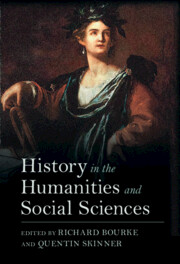96 results
Index
-
- Book:
- History in the Humanities and Social Sciences
- Published online:
- 08 December 2022
- Print publication:
- 22 December 2022, pp 408-416
-
- Chapter
- Export citation
Contents
-
- Book:
- History in the Humanities and Social Sciences
- Published online:
- 08 December 2022
- Print publication:
- 22 December 2022, pp v-vi
-
- Chapter
- Export citation
Figures
-
- Book:
- History in the Humanities and Social Sciences
- Published online:
- 08 December 2022
- Print publication:
- 22 December 2022, pp vii-vii
-
- Chapter
- Export citation
7 - History and Normativity in Political Theory: The Case of Rawls
-
-
- Book:
- History in the Humanities and Social Sciences
- Published online:
- 08 December 2022
- Print publication:
- 22 December 2022, pp 165-193
-
- Chapter
- Export citation
Introduction
-
- Book:
- History in the Humanities and Social Sciences
- Published online:
- 08 December 2022
- Print publication:
- 22 December 2022, pp 1-19
-
- Chapter
- Export citation
Copyright page
-
- Book:
- History in the Humanities and Social Sciences
- Published online:
- 08 December 2022
- Print publication:
- 22 December 2022, pp iv-iv
-
- Chapter
- Export citation
Contributors
-
- Book:
- History in the Humanities and Social Sciences
- Published online:
- 08 December 2022
- Print publication:
- 22 December 2022, pp viii-viii
-
- Chapter
- Export citation
Acknowledgements
-
- Book:
- History in the Humanities and Social Sciences
- Published online:
- 08 December 2022
- Print publication:
- 22 December 2022, pp ix-x
-
- Chapter
- Export citation

History in the Humanities and Social Sciences
-
- Published online:
- 08 December 2022
- Print publication:
- 22 December 2022
4 - Erskine Childers, from The Framework of Home Rule
- from 1911
-
- Book:
- The Political Thought of the Irish Revolution
- Published online:
- 21 April 2022
- Print publication:
- 05 May 2022, pp 61-98
-
- Chapter
- Export citation
24 - Horace Plunkett, A Defence of the Convention
- from 1917
-
- Book:
- The Political Thought of the Irish Revolution
- Published online:
- 21 April 2022
- Print publication:
- 05 May 2022, pp 261-268
-
- Chapter
- Export citation
26 - Alice Stopford Green, Loyalty and Disloyalty: What it Means in Ireland
- from 1918
-
- Book:
- The Political Thought of the Irish Revolution
- Published online:
- 21 April 2022
- Print publication:
- 05 May 2022, pp 285-293
-
- Chapter
- Export citation
Index
-
- Book:
- The Political Thought of the Irish Revolution
- Published online:
- 21 April 2022
- Print publication:
- 05 May 2022, pp 366-392
-
- Chapter
- Export citation
Introduction
-
- Book:
- The Political Thought of the Irish Revolution
- Published online:
- 21 April 2022
- Print publication:
- 05 May 2022, pp ix-xli
-
- Chapter
- Export citation
23 - Hanna Sheehy-Skeffington, ‘State of Ireland’
- from 1917
-
- Book:
- The Political Thought of the Irish Revolution
- Published online:
- 21 April 2022
- Print publication:
- 05 May 2022, pp 257-260
-
- Chapter
- Export citation
30 - Arthur Griffith, ‘Debate on Treaty’
- from 1921
-
- Book:
- The Political Thought of the Irish Revolution
- Published online:
- 21 April 2022
- Print publication:
- 05 May 2022, pp 341-348
-
- Chapter
- Export citation
1917
-
- Book:
- The Political Thought of the Irish Revolution
- Published online:
- 21 April 2022
- Print publication:
- 05 May 2022, pp 255-256
-
- Chapter
- Export citation
1911
-
- Book:
- The Political Thought of the Irish Revolution
- Published online:
- 21 April 2022
- Print publication:
- 05 May 2022, pp 35-36
-
- Chapter
- Export citation
7 - Ulster’s Solemn League and Covenant
- from 1912
-
- Book:
- The Political Thought of the Irish Revolution
- Published online:
- 21 April 2022
- Print publication:
- 05 May 2022, pp 140-140
-
- Chapter
- Export citation
6 - Edward Carson, ‘Settlement of an Old Controversy’
- from 1912
-
- Book:
- The Political Thought of the Irish Revolution
- Published online:
- 21 April 2022
- Print publication:
- 05 May 2022, pp 123-139
-
- Chapter
- Export citation



